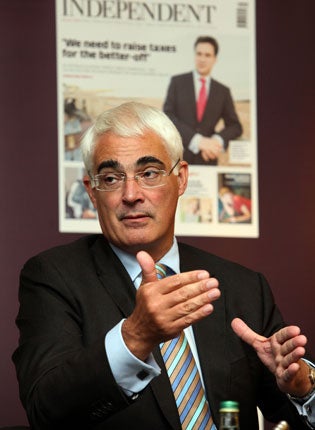Darling urges David Miliband to accept Shadow Cabinet role

Alistair Darling delivered a public plea last night to David Miliband not to turn his back on the party following his dramatic defeat to his younger brother in the Labour leadership election.
As Mr Miliband agonises over his political future, Mr Darling hinted at The Independent's fringe meeting that he wanted him to remain in the Labour top team as shadow Chancellor.
Mr Darling, a key backer of the older Miliband, refused to disclose his preferred candidate to take over from him in the role, but left his audience in no doubt who he had in mind.
"I hope David remains heavily engaged in the Labour Party in whatever way he thinks is appropriate and whatever way Ed thinks appropriate," he said. "He is still young and he still has a huge amount to give."
The shadow Chancellor, who is stepping down from the frontbench after more than 20 years, suggested he could return in 2012.
Many Labour MPs had assumed that Mr Darling was retiring from the front line for good.
"I'm going to be thinking for at least two years," he said. "A hell of lot can happen in those two years.
"I'm still relatively young. So I will decide what I want to do... In politics it's silly to say never."
In a relaxed and candid interview, he said he felt "great" about stepping out of the limelight for the moment, explaining: "It won't be long before I can say what I think."
Mr Darling said he did not quibble with Ed Miliband's victory, but acknowledged that Labour's complicated system for picking a leader contained "oddities" which the party could revisit.
"There may well be a case for asking ourselves whether this is the right thing," he said. "Ed has won this election. David is quite right to say today Ed has won and let's rally around him."
He conceded that the internecine strife between the Blairites and Brownites had been a "debilitating" drag on Labour's fortunes since 1994.
He warned: "This has got no place in the party – our opponents are the Tories. You can actually get on and serve in government without having to join one tribe or another."
Mr Darling, who famously complained that he had unleashed the "forces of hell" within the Government after he warned of the severity of the recession, said it would be "absolutely naïve" to believe unattributable briefings could be banned.
But he added: "Where it becomes damaging to a political party or a government it needs to be stamped out. It's corrosive. It can bring governments down."
Mr Darling urged the new leader against a move to the left, warning that Labour had to remain in the political centre-ground if it wanted to return to office – and offer "realistic and credible" proposals for stimulating the economy.
He warned the party not to fall into its historic trap of campaigning on higher taxes.
"If people think that by voting for you, it's just the start of more and more impositions on them, they get hacked off with you," he said.
"The case for taxation and the case for public spending has to be made, but I think at our peril we forget the lessons learnt 10 or 15 years ago."
Meanwhile, Charles Clarke, the arch Blairite unseated at the last election, said at a fringe meeting yesterday that Labour had been wrong to sacrifice its reputation for economic competence with frivolous spending before the last election.
"Gordon Brown had achieved a great thing in overthrowing the reputation of Labour in the past that it couldn't run the economy. Unfortunately, in my opinion, we threw that away in the last Government," he said. "For me, that remains the absolutely central question for Labour now."
Join our commenting forum
Join thought-provoking conversations, follow other Independent readers and see their replies
Comments
Bookmark popover
Removed from bookmarks